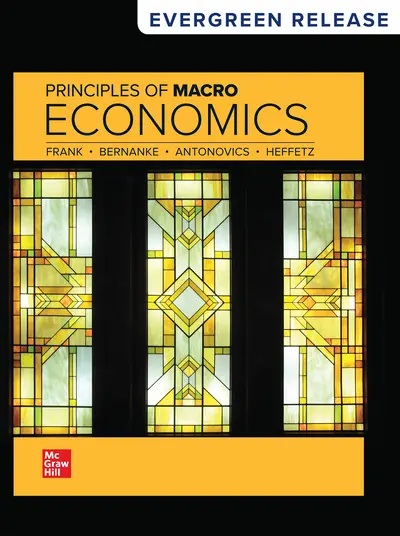My Account Details


Principles of Macroeconomics: 2024 Release
Format Options:
-
Lowest Price!
eBook from $62.33 -
Print from $70.00 -
Connect from $133.92
McGraw Hill eBook
Textbook Rental (150 Days Access)
- Rent for a fraction of the printed textbook price
- Complete text bound in hardcover or softcover
Loose-Leaf Purchase
Unbound loose-leaf version of full text
Shipping Options
- Standard
- Next-day air
- 2nd-day air
Orders within the United States are shipped via FedEx or UPS Ground. For shipments to locations outside of the U.S., only standard shipping is available. All shipping options assume the product is available and that processing an order takes 24 to 48 hours prior to shipping.
Note: Connect can only be used if assigned by your instructor.
Connect (180 Days Access)
- Digital access to a comprehensive online learning platform
- Includes homework, study tools, eBook, and adaptive assignments
- Download the free ReadAnywhere app to access the eBook offline
Connect + Loose-Leaf
- Comprehensive online learning platform + unbound loose-leaf print text package
- Connect includes homework, study tools, eBook, and adaptive assignments
- Download the free ReadAnywhere app to access the eBook offline
Shipping Options
- Standard
- Next-day air
- 2nd-day air
Orders within the United States are shipped via FedEx or UPS Ground. For shipments to locations outside of the U.S., only standard shipping is available. All shipping options assume the product is available and that processing an order takes 24 to 48 hours prior to shipping.
* The estimated amount of time this product will be on the market is based on a number of factors, including faculty input to instructional design and the prior revision cycle and updates to academic research-which typically results in a revision cycle ranging from every two to four years for this product. Pricing subject to change at any time.
Instructor Information
Quick Actions (Only for Validated Instructor Accounts):
Principles of Macroeconomics is a fascinating exploration of the economic world.
Embark on an exploration of macroeconomics with its 2024 release, unfolding against the backdrop of unprecedented economic transformations. As the world grapples with challenges, this product’s focused approach equips you to decipher the complexities of macroeconomics in a rapidly evolving environment. This product’s philosophy stands strong: strip away the unnecessary and intensify focus on central concepts. Our goal is to produce macroeconomic naturalists who see each economic event because of a cost-benefit calculation. From understanding the reasons behind holding U.S. dollars to unraveling the impact of inflation, this textbook actively engages students, making macroeconomics a language they speak fluently. With heavy emphasis on globalization, this text navigates real wage inequality, costs and benefits of trade, protectionism, and the link between exchange rates and monetary policy. Frank, Nobel-Prize winner: Bernanke, Antonovics, and Heffetz bring expertise to every chapter keeping the learning fresh, engaging, and always up-to-date.
1 Thinking Like an Economist
2 Comparative Advantage
3 Supply and Demand
PART 2: MACROECONOMIC ISSUES AND DATA
4 Macroeconomics: The Bird’s-Eye View of the Economy
5 Measuring Economic Activity: GDP and Unemployment
6 Measuring the Price Level and Inflation
PART 3: THE ECONOMY IN THE LONG RUN
7 Economic Growth, Productivity, and Living Standards
8 The Labor Market Workers, Wages, and Unemployment
9 Saving and Capital Formation
10 Money, Prices, and the Federal Reserve
11 Financial Markets and International Capital Flows
PART 4: THE ECONOMY IN THE SHORT RUN
12 Short-Term Economic Fluctuations: An Introduction
13 Spending and Output in the Short Run
14 Stabilizing the Economy: The Role of the Fed
15 Aggregate Demand, Aggregate Supply, and Inflation
PART 5: THE INTERNATIONAL ECONOMY
16 International Trade and Trade Policy
17 Exchange Rates and the Open Economy
Main Features
- LMS Integration
- Print/Loose-Leaf Book Add-On Availability
- Presentation Slides & Instructor Resources
- Question & Test Banks
- Adaptive Assignments
- Student Progress Reporting & Analytics
- Essay Prompts
- Polling
- Prebuilt Courses
- Interactive Exercises
- eBook Access (ReadAnywhere App)
- Remote Proctoring (Proctorio)
- Subject-Specific Tools
About the Author
Robert Frank
Professor Heffetz received his B.A. in physics and philosophy from Tel Aviv University in 1999 and his Ph.D. in economics from Princeton University in 2005. He is an Associate Professor of Economics at the Samuel Curtis Johnson Graduate School of Management at Cornell University, where he has taught since 2005. Bringing the real world into the classroom, Professor Heffetz has created a unique macroeconomics course that introduces basic concepts and tools from economic theory and applies them to current news and global events. His popular classes are taken by hundreds of students every year, on the Cornell Ithaca campus and, via live videoconferencing, in dozens of cities across the U.S., Canada, and beyond. Professor Heffetz’s research studies the social and cultural aspects of economic behavior, focusing on the mechanisms that drive consumers’ choices and on the links between economic choices, individual well-being, and policymaking. He has published scholarly work on household consumption patterns, individual economic decision making, and survey methodology and measurement. He was a visiting researcher at the Bank of Israel during 2011, is currently a Faculty Research Fellow at the National Bureau of Economic Research (NBER), and serves on the editorial board of Social Choice and Welfare.
Ben Bernanke
2022 Nobel Prize winner, Professor Bernanke received his B.A. in economics from Harvard University in 1975 and his Ph.D. in economics from MIT in 1979. He taught at the Stanford Graduate School of Business from 1979 to 1985 and moved to Princeton University in 1985, where he was named the Howard Harrison and Gabrielle Snyder Beck Professor of Economics and Public Affairs where he served as chair of the Economics Department. Professor Bernanke is currently a Distinguished Fellow in Residence with the Economic Studies Program at the Brookings Institution.
Professor Bernanke was sworn in on February 1, 2006, as chair and a member of the Board of Governors of the Federal Reserve System; his second term expired January 31, 2014. Professor Bernanke also served as chair of the Federal Open Market Committee, the Fed’s principal monetary policymaking body. Professor Bernanke was also chair of the President’s Council of Economic Advisers from June 2005 to January 2006. Professor Bernanke’s intermediate textbook, with Andrew Abel and Dean Croushore, Macroeconomics, 9th Edition (Addison-Wesley, 2017), is a best-seller in its field. He has authored numerous scholarly publications in macroeconomics, macroeconomic history, and finance. He has done significant research on the causes of the Great Depression, the role of financial markets and institutions in the business cycle, and measurement of the effects of monetary policy on the economy.
Professor Bernanke has held a Guggenheim Fellowship and a Sloan Fellowship, and he is a Fellow of the Econometric Society and of the American Academy of Arts and Sciences. He served as the director of the Monetary Economics Program of the National Bureau of Economic Research (NBER) and as a member of the NBER’s Business Cycle Dating Committee. From 2001 to 2004 he served as editor of the American Economic Review, and as president of the American Economic Association in 2019. Professor Bernanke’s work with civic and professional groups includes having served two terms as a member of the Montgomery Township (New Jersey) Board of Education.
In 2022, Dr. Bernanke, was awarded the Nobel Prize in Economics in Stockholm, Sweden. He was awarded the Sveriges Riksbank Prize in Economic Sciences in Memory of Alfred Nobel 2022 for his work on bank runs and measures to prevent them. He changed our understanding of economic downturns. Dr. Bernanke’s research showed how bank runs and failed monetary policy prolonged the Great Depression (1929-1939). Bernanke’s work was invaluable during the 2008 global financial crisis when, as Fed Chair, he applied the lessons from the great depression and pioneered the emergency lending programs the central banks used to address the crisis.
Kate Antonovics
Professor Antonovics received her B.A. from Brown University in 1993 and her Ph.D. in economics from the University of Wisconsin in 2000. Shortly thereafter, she joined the faculty in the Economics Department at the University of California, San Diego, where she has been ever since. Professor Antonovics is known for her superb teaching and her innovative use of technology in the classroom. Her highly popular introductory-level microeconomics course regularly enrolls over 450 students each fall. She also teaches labor economics at both the undergraduate and graduate level. In 2012, she received the UCSD Department of Economics award for best undergraduate teaching. Professor Antonovics’s research has focused on racial discrimination, gender discrimination, affirmative action, intergenerational income mobility, learning, and wage dynamics. Her papers have appeared in the American Economic Review, the Review of Economics and Statistics, the Journal of Labor Economics, and the Journal of Human Resources. She is a member of both the American Economic Association and the Society of Labor Economists.
Ori Heffetz
Professor Heffetz received his B.A. in physics and philosophy from Tel Aviv University in 1999 and his Ph.D. in economics from Princeton University in 2005. He is an Associate Professor of Economics at the Samuel Curtis Johnson Graduate School of Management at Cornell University, where he has taught since 2005. Bringing the real world into the classroom, Professor Heffetz has created a unique macroeconomics course that introduces basic concepts and tools from economic theory and applies them to current news and global events. His popular classes are taken by hundreds of students every year, on the Cornell Ithaca campus and, via live videoconferencing, in dozens of cities across the U.S., Canada, and beyond. Professor Heffetz’s research studies the social and cultural aspects of economic behavior, focusing on the mechanisms that drive consumers’ choices and on the links between economic choices, individual well-being, and policymaking. He has published scholarly work on household consumption patterns, individual economic decision making, and survey methodology and measurement. He was a visiting researcher at the Bank of Israel during 2011, is currently a Faculty Research Fellow at the National Bureau of Economic Research (NBER), and serves on the editorial board of Social Choice and Welfare.
Accessibility
Creating accessible products is a priority for McGraw Hill. We make accessibility and adhering to WCAG AA guidelines a part of our day-to-day development efforts and product roadmaps.
For more information, visit our accessibility page, or contact us at accessibility@mheducation.com
Affordability
Reduce course material costs for your students while still providing full access to everything they need to be successful. It isn't too good to be true - it's Inclusive Access.
Need support? We're here to help - Get real-world support and resources every step of the way.

